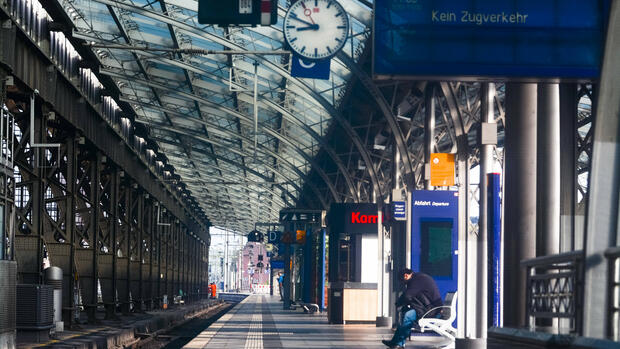The EVG had already twice called for strikes in the collective bargaining dispute.
(Photo: IMAGO/NurPhoto)
Berlin According to a media report, the railway union EVG is threatening new, even more severe work stoppages at the railways. “We could paralyze the railway for weeks,” said negotiator Cosima Ingenschay of the “Süddeutsche Zeitung”.
Both sides again accused each other of not being interested in serious negotiations. Bahn boss Richard Lutz called on the EVG to “continue the negotiations immediately and not to drag out the collective bargaining round any further”. “Our employees are waiting for money, our passengers expect solutions,” Lutz told journalists in Berlin.
The EVG has been negotiating a new collective agreement with the state-owned group since the end of February. DB declared the last round of talks to be over on Wednesday. The company cited a refusal by the union to negotiate the new Deutsche Bahn offer for around 180,000 employees as the reason. In addition to a tax and duty-free inflation adjustment of a total of 2850 euros, it provides for a gradual increase from March next year of a total of ten percent for the lower and middle wage groups and eight percent for the upper wage groups.
The union rejects the offer as non-negotiable. It demands at least 650 euros more per month or twelve percent for the upper income group and a term of one year. The next hearing is scheduled for the end of May.
The wage conflict has already been accompanied by two warning strikes. In March, EVG, working hand in hand with Verdi, paralyzed large parts of the traffic for a day. In addition to the railway, numerous airports and some local public transport were affected. A week ago, Deutsche Bahn employees went on strike again for eight hours. The DB had to stop long-distance traffic for hours, and almost no trains were running in local and regional traffic either.
EVG accuses Bahn of no serious negotiating interest
“Two warning strikes should actually be enough to get a negotiable wage offer,” Ingenschay told the “SZ”. But the railway is apparently not interested in serious negotiations. “It is the railways that are provoking the new strikes,” said the EVG negotiator.
DB boss Lutz, on the other hand, emphasized that the current employer offer is the highest in the company’s history. “We have more than doubled our first offer and have taken a huge step towards the union.” “Then the question arises: What else?”
A sticking point in the negotiations is the issue of the minimum wage. Around 2,000 employees have so far only received this through allowances because the statutory minimum wage has risen faster than the tariff tables in recent years. “Before we negotiate, the statutory minimum wage of twelve euros must be anchored in the salary table,” said Ingenschay. “Otherwise the ten percent wage increase for the 2,500 employees will be gone immediately.”
Deutsche Bahn, on the other hand, refuses to clarify the minimum wage issue in advance before entering into the actual collective bargaining. Instead, it offers 13 euros per hour, but does not want to include this in the tables until August 2024.
According to Ingenschay, the next warning strikes will last longer. “The effects obviously have to be more massive so that it hurts the employer.” It is conceivable that the EVG would start campaigns in different regions one after the other. Or that train attendants and other professional groups go on strike in turn. But these are all still conceptual models. “The railway system is so fragile that if we take out a few interlockings, everything will collapse,” said Ingenschay.
More: Why the railway wage conflict is stuck – and new strikes are imminent
First publication: 04/28/2023, 07:44 a.m.
